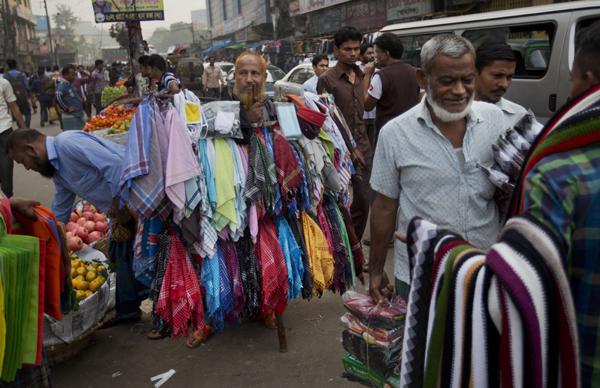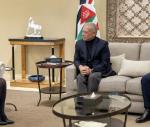You are here
ADB urges Bangladesh to develop capital market to spur economy
By Reuters - Dec 13,2015 - Last updated at Dec 14,2015

In this December 8 photo, Bangladeshi street vendors stand on a busy road and wait for customers in Dhaka (AP photo)
DHAKA — The Asian Development Bank (ADB) encouraged Bangladesh on Saturday to use the more than $553 million it has provided so far in loans to develop a capital market and attract private investors.
Bangladesh aims to become a middle-income country (MIC) by 2021.
"A well-functioning capital market can catalyse private sector investment in infrastructure and other sectors creating employment and economic growth," Kazuhiko Higuchi, the ADB's country director in Bangladesh, told Reuters in an interview.
The ADB has been supporting government efforts to develop the capital market in Bangladesh for more than two decades and has recently signed agreements with the government for the third such programme, he said, meaning funding is likely to continue.
This will support policy actions to strengthen the capital market regulator, boost institutional investor demand, broaden the supply of financial instruments, and promote a more liquid government bond market, Higuchi added, supporting the drive for middle-income status.
Last month, 28 representatives of Bangladesh's development partners, meeting in Dhaka, said the government should raise spending on infrastructure to $12 billion annually, particularly for energy, transport and ports, and aim to attract private sector investors rather than depending on aid.
During this meeting, the ADB promised $5 billion in loans to Bangladesh from 2016 to 2018, mainly to improve infrastructure.
"A strong and well-functioning capital market can help to boost the funds dedicated for the infrastructure development sector," Higuchi said.
The government has outlined measures to improve the transparency and efficiency of the capital market and encourage private sector financing in a five-year plan to June 2020.
Higuchi acknowledged that Bangladesh has made some progress in developing its capital market but needs to do more to strengthen its regulation.
"The market participants need to adopt information and communication technology for enhanced effectiveness, efficiency and transparency," he said.
He suggested ways to broaden and deepen the capital market, including bringing in international strategic investors as shareholders, which would help to improve governance and technology, and more institutional investors, such as insurance companies. It could also tap into demand for Islamic financial instruments.
"The capital market lacks the desired depth and breadth because of an absence of alternative financial instruments, such as derivatives and sukuks, a Sharia-compliant bond," Higuchi indicated.
He said demand for securities is also hampered by unreliable accounting and auditing of listed companies, and the ADB has been working closely with the government to raise reporting standards.
Separately, the Japanese embassy in Dhaka announced its largest loan package to Bangladesh since 1974.
The embassy said Bangladesh will receive $1.11 billion in loans from Japan for infrastructure, investment and health projects.
The projects include a foreign direct investment promotion project, the strengthening of the Dhaka-Chittagong main power grid, bridge improvements in western Bangladesh, maternal, neonatal and child health projects, support for local governance and an urban building safety project.
For all these projects, interest rates are 0.01 per cent and repayment periods are 40 years with 10 years' grace, indicated a statement from the Japanese embassy.
Last month, donors told Bangladesh it should raise spending on infrastructure to $12 billion annually, particularly in energy, transport and ports.
Bangladesh currently spends just 3 per cent of the gross domestic product in this sector.
At a meeting in November, donors including the World Bank, International Monetary Fund and USAID also told Bangladesh to reduce its dependence on foreign aid and to work more closely with the private sector on major projects.
Japan's ambassador to Bangladesh and a senior official of the ministry of finance signed an agreement on the official development assistance on Sunday.
During a visit by Bangladesh Prime Minister Sheikh Hasina to Japan in May 2014, Japanese Prime Minister Shinzo Abe pledged to provide up to $5.1 billion of additional assistance to Bangladesh over the next four to five years.
Related Articles
The Asian Development Bank (ADB) on Tuesday said growth in developing Asia will edge higher over the next two years, but faces being constrained by China's campaign to cool its economy.
AMMAN — The IFC, a member of the World Bank Group, and the government of the Netherlands on Monday launched a multi-sector programme in Jord
AMMAN — The European Bank for Reconstruction and Development (EBRD) on Monday launched a series of training sessions for judges in Jordan as

















